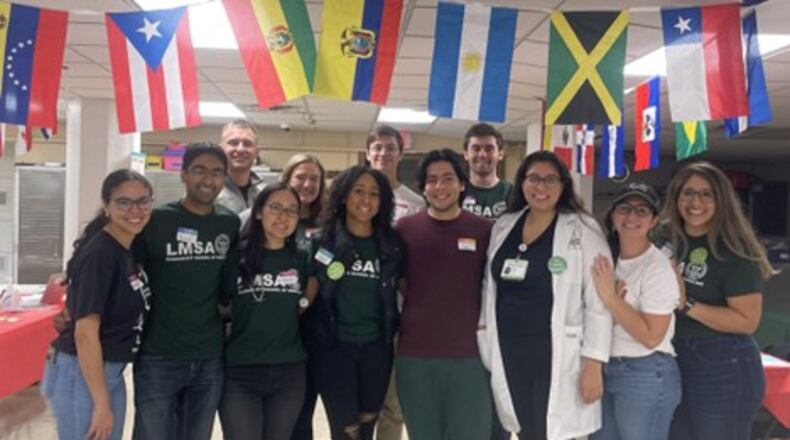The Latino Wellness Clinic also helps Latino medical students serve the local Latino community more directly. A burgeoning Latino population in the area faces many stigmas and language barriers in everyday life, including that of health care and wellness, the Latino Center said.
“Many of our Latino medical students were inspired to become doctors based on their own experience growing up and having to translate for family members and doctors at a young age,” said Catherine Hernandez Hogan, assistant director of the Latino Center.
Last year, Sade Fayiga, a second-year student in the Boonshoft School of Medicine from Miami, shared with Hernandez-Hogan a bilingual mobile health clinic model she experienced at the University of Miami, setting the stage for the establishment of the health clinics.
The upcoming clinic’s primary focus is on increasing access to health care for the underserved Hispanic/Latino population in East and Old North Dayton, Hernandez Hogan said.
It can be difficult for Latino/Hispanic community members to find health care professionals who speak Spanish in the area, said Hernandez Hogan, which can lead to frustration and a lack of trust in the health care system.
This may lead to someone putting off care, potentially causing any underlying health conditions to worsen.
“When patients struggle to communicate their concerns or understand the instructions provided by healthcare providers, they might hesitate to seek immediate care,” Fayiga said. “Additionally, the lack of fluency in the local language creates feelings of uneasiness, further deterring individuals from seeking timely medical attention. Patients may postpone seeking help until their conditions worsen or become unbearable.”
Fayiga experienced what a language barrier was like first hand when she was growing up and helped translate for her mother, showing her early on the significance of language in accessing proper care, she said.
“It highlighted the struggles faced by Spanish-speakers in navigating healthcare systems and underscored the importance of bridging language gaps to ensure equitable access to quality medical services,” Fayiga said.
Hernandez Hogan was moved by how students worked to solve a problem in the community, she said.
“It is this very need that caused them to want to become doctors in the first place. Our students, who experienced being the communication bridge for their families, are now bridging the gap in our community by creating this bilingual and culturally sensitive environment that connects community members with wellness resources and health screening services,” Hernandez Hogan said.
Two clinics have been held, serving more than 200 community members. A third clinic will be offered on 9 a.m. to noon on Saturday at Our Lady of the Rosary Church, 22 Notre Dame Ave. in Dayton.
Future clinics are scheduled for February, March and April, with a goal to hold monthly clinics on a permanent basis.
The upcoming clinic will be able to address a number of health concerns, as well as allow patients to be able to speak with a Spanish-speaking physician and ask questions about their test results. Services will include flu vaccinations, BMI checks, skin cancer awareness, HbA1c tests for diabetes management, blood pressure readings, and nutrition guidance, Fayiga said.
Additionally, there will be OBGYN consultations for any questions related to women’s health.
Approximately 30 Wright State students volunteer at each clinic, including Fayiga, who is president of the Latino Medical Student Association; Natalie Castillo, a fourth-year medical student from Defiance; and Gisella Michelle Drouet, who is originally from Guayaquil, Ecuador, and is in her final year of medical school.
“The clinic enables medical students, regardless of their Hispanic or Latino/a/x/e identification, to engage with a diverse community, mirroring the diversity that we will encounter in our future practice,” Fayiga said.
A future surgeon, Drouet will be heading the health screening station and registration, said contributing to the clinic was a no-brainer for her.
“I understand the need and great benefit these clinics have in the community,” she said. “We recognize there is more to health than physical health, and we wanted to use a holistic approach by providing law, mental health and financial literacy information as well.”
Castillo hopes to join an obstetric and gynecology residency focusing on serving diverse populations after she graduates from the Boonshoft School of Medicine.
“It is for this reason that I do think these clinics are an extension of my education,” Castillo said. “They allow me to form stronger connections with the community I plan to continue to serve, as well as give me insight into how I can better be of service to them.”
Attendees will be able to connect with providers like Dr. Julio Soto, a primary care physician with Premier Health, and Dr. Ruth Claros, an OBGYN physician with Premier Health. Both are fluent in Spanish and English and can help answer questions, provide insight and connect attendees to various resources, Hernandez Hogan said.
Additional community partners assisting in these efforts include Premier Health, Kettering Health, Prevent Blindness, ABLE Law, graduate students from Wright State’s School of Professional Psychology, the Sinclair Community College Dental Hygienist Program and Public Health – Dayton and Montgomery County.
About the Author

